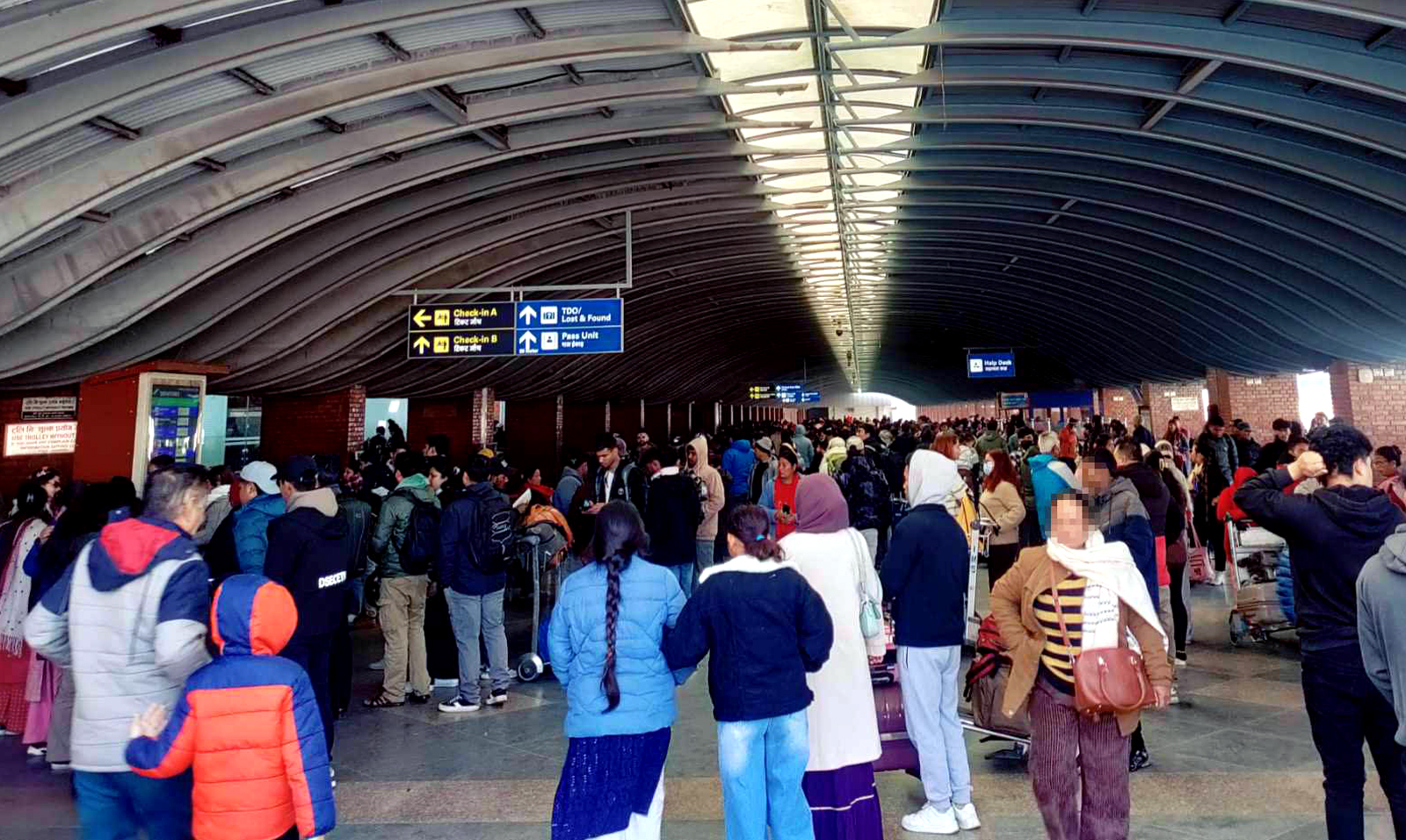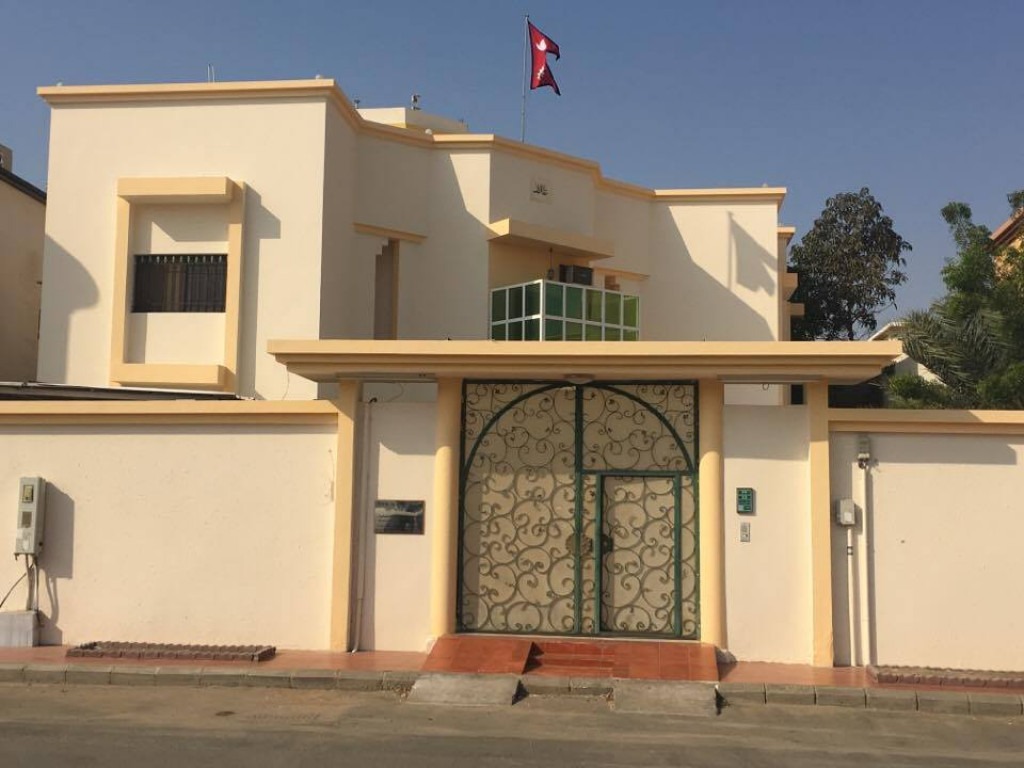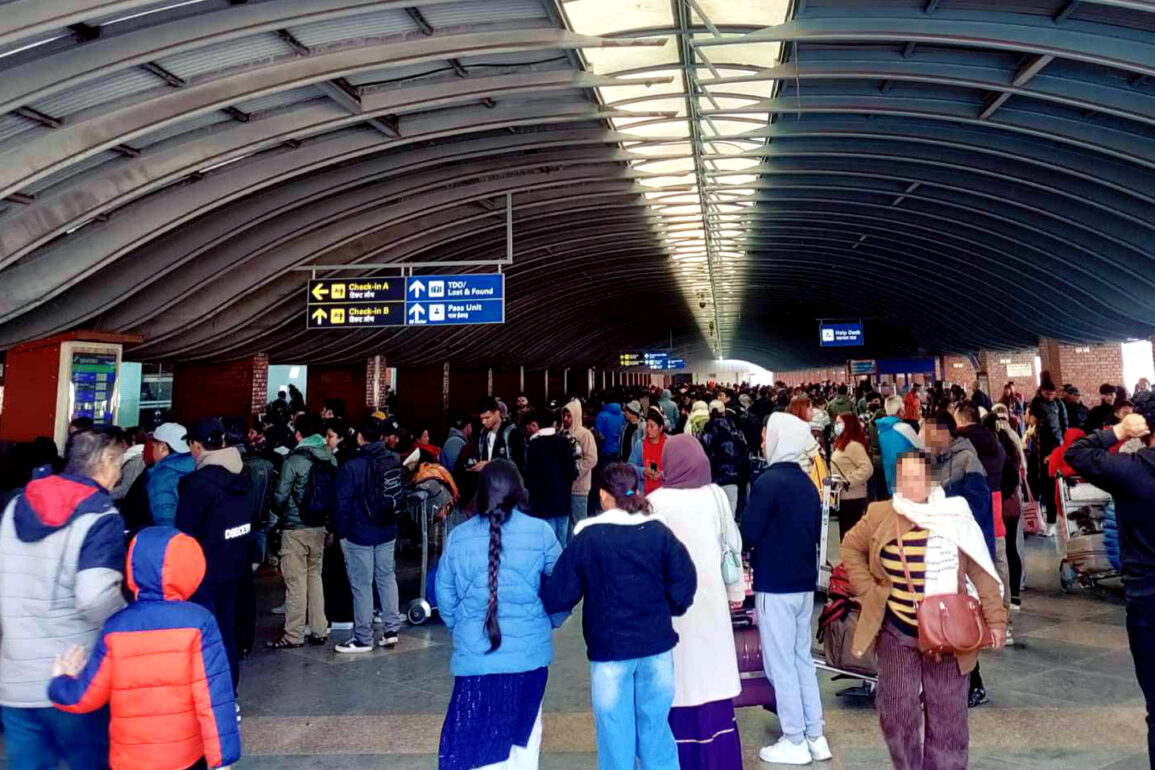After his marriage in Baisakh last year, Suraj Sarkar, 26, of Ramdhuni in Sunsari district, returned to Malaysia for work. Five months ago, the Malaysian police arrested him while he was on his way to the grocery store. According to Suraj’s wife, Ranju, the police accused him of keeping drugs at his residence. “He once called me from jail and said he would be released if we sent him Rs 75,000,” she said. “We sent him the amount but we haven’t heard from him again.”
Suraj had been working as a labourer in Malaysia for seven years. His family has reported about his case to officials from the local unit and the consular department in Kathmandu but haven’t received any response.
Arjun BK, a 34-year-old from Nuwakot, has been inside the Ajman Central Jail in the UAE for over a year. When he switched companies, citing the harsh work environment at the previous one, he was arrested alongside two other Nepalis—Dev Rai and Anil Nepali. While Dev and Anil were deported after 15 days, Arjun is still behind the bars. His mother, Savitri, awaits a response to her question: “While others arrested alongside him are already back home, why is my son still in jail?”
Hundreds of Nepalis inside foreign prisons
According to data from Nepal’s embassies and Ministry of Labour, Employment and Social Security, as many as 1,347 Nepalis are behind bars in Saudi Arabia, Qatar, the UAE, Malaysia, Kuwait, Oman and Bahrain. But the real figure may be much higher.
Migrant workers often languish in police custody in gulf countries without getting to contact their family members. They can contact their family members only if someone helps them out. Because of language barriers and lack of legal knowledge, they often don’t even know the reason behind their arrest.

Officials at Nepali embassies in the gulf say the governments there don’t provide information to them about jailed or hospitalised Nepali migrant workers. Getting the information tends to be a long process and it’s hard to come across an exact number. For instance, the Nepali embassy in UAE doesn’t have a record of Arjun’s jailing, according to labour attache Pankaj Kayastha. That’s why, it can be assumed that the number of Nepalis in foreign jails is much higher than what official records show.
“The attendance of embassy representatives is important in custody,” says Umakanta Pandey, a Nepali journalist based in the UAE. Pandey himself once spent 85 days in UAE police custody in 2022. He was arrested after he posted a Facebook status that said embassy officials might have been involved in the trafficking of Nepali migrant workers. At the time, he had met many Nepali migrant workers who were arrested and had no way to contact their family members or access legal help.
Pandey cites the cases of Birendra Kumar Sah of Dhanusa and Sujan Limbu of Morang who were taken into custody without getting to voice their side of the matter. Sujan was accused of murdering his Sri Lankan colleague. But Sujan says the incident happened after the colleague attacked him and he defended himself. “But Sujan hasn’t been able to tell his side of the story to anyone,” Pandey says. “At least the embassy should have listened to him and taken his side of the story to the court.”
During his time in custody, Pandey saw teams including labour attaches from countries like India, Pakistan, and Bangladesh visiting the prison twice a week but no Nepali teams were to be seen.
Pandey was instead arrested based on a tip from then Nepali ambassador to UAE Krishna Prasad Dhakal. After Nepal-related organisations in the UAE corresponded with Dhakal to help them withdraw Pandey’s case, Dhakal had instead asked the police to arrest him on charge that Pandey might incite the Nepali community to violence.
About two months after the arrest, a copy of Dhakal’s request to UAE police to arrest Dhakal was leaked. Dhakal was forced to withdraw the case when the journalists’ federation submitted the copy to the Ministry of Foreign Affairs. But neither the ministry punished Dhakal nor did Pandey get the gadgets seized while he was taken into custody.
Legal assistance only on paper
According to official data, there are 810 Nepali migrant workers in jails in Saudi Arabia, 243 in UAE, 67 in Qatar, 51 in Kuwait, 12 in Oman, 1 in Bahrain, 28 in South Korea, 24 in Japan and 163 in Malaysia.
The Foreign Employment Board has issued a directive for Nepali migrant workers abroad to help them with legal self-defence. The directive has allowed the embassies or other diplomatic missions at the respective countries to provide legal help to Nepali workers charged with criminal offences. But the embassies and missions have been indifferent to such Nepalis.

The directive also mentions that in case of Nepali migrant workers with a labour permit, the embassy or diplomatic mission can provide up to Rs 1.5 million for legal self-defence.
The directive also asks embassies and diplomatic missions to keep a record of Nepali migrant workers charged with criminal offences and the situation of their legal fight. But the missions’ help in such matters is rare. The evidence that the board is currently assisting only two such Nepalis in the UAE, about six years since the directive came into effect, is especially telling.
“In 2078 BS, two migrant workers in the UAE were recommended for help and we have been provided Rs 1.5 million each as assistance for them,” says Dr Dwarika Prasad Uprety, executive director of Foreign Employment Board. Uprety says the board has not received such recommendation since.
Meanwhile, Baliram Prasad Dhami, information officer at Nepali embassy in Malaysia, says that though the embassy has asked the board to provide monetary help in such cases, the board has been delaying. “I sent as many as four letters asking for such help last year,” Dhami said. “But the board said it was amending the directive itself.”
While the board often dithers on its commitment to provide Rs 1.5 million for legal help, the amount is much less for mounting a valid legal self-defence, says Dinbandhu Subedi, former labour councillor at Nepali embassy in UAE. “Rs 1.5 million is not enough to even pay for an average lawyer,” says Subedi, who just returned to Nepal four months ago after completing his tenure. “Moreover, the payment process is tedious. Though the government has formulated the directive, there’s uncertainty regarding its implementation.”
Meanwhile, Tikamani Neupane, former labour councillor at Nepali embassy in Qatar, says that troubled Nepali migrant workers in the country rarely ever ask the embassy for legal help. Neupane, who has also served in the board, says that the directive is not practical and he tried to amend it during his time at the board.
Dr Uprety, the foreign employment board executive director, however, claims that it is rare for an innocent person to be in police custody, hence the number of those seeking legal help with the embassies is low. “We may think that all the Nepali migrant workers in trouble are innocent but that is not always the case,” Uprety says. “They know they have made a mistake, hence they don’t seek any help.”
Moreover, Uprety raises questions on the provisions of the directive. “Every year, around 1000-1,500 Nepali migrant workers are jailed in foreign lands,” he says. “If we sent Rs 1.5 million to every worker, the amount in the fund would not last even a couple of years.”
Clause 51 (i) of Nepal’s constitution enshrines a policy to “regulate and manage the sector in order to make foreign employment free from exploitation, safe and systematic and to guarantee employment and rights of the labourers.” Likewise, the Foreign Employment Act 2064’s clause 33 (b) states the provision to help Nepali migrant workers charged of criminal offence in foreign lands fight their legal battle by utilising the Labour Welfare Fund. But the government doesn’t appear to have implemented these provisions.
Advocate Som Luintel, an expert on labour migration, accuses the government of not wanting to help Nepali migrant workers mount a legal self-defence. “Every jailed worker has the right to legal self-defence. The government has issued a directive to ensure that right for them,” Luintel says. “But embassy and board officials are not interested in helping the troubled labourers since they don’t get personal benefits out of that.”
Rameshwor Nepal, executive director of Equidem Research Nepal, which works for labour welfare, also accuses the government of neglecting the directive it launched itself.
Meanwhile, a high-level official working at a foreign mission says that it is impractical for the government to spend money on a migrant worker who has breached the law of the foreign land. “If the government spends Rs 1.5 million on every accused worker, the provision will get abused,” he says.
Luintel, however, says that it is not for officials to say if the provision is impractical; if the provision is not practical, it is the responsibility of policy makers to amend it. “Bureaucrats are responsible for implementing the policies,” he says. “If need be, policy makers will amend it.”
Embassies’ negligence, government’s indifference
Nepali migrant workers are spread across 149 countries. In the last fiscal year 2080/81, as many as 741,297 Nepalis, including 661,125 men and 80,172 women, took labour permits for 149 countries.
Even if the government has permitted employment in 178 countries, including 111 in institutional terms, Nepalis are working in banned countries like Russia, Ukraine, Syria, Somalia and Sudan where wars are raging.
The government doesn’t have exact details of how many Nepalis are in foreign jails and hospitals.
The newly appointed ambassador to Saudi Arabia Naresh Dhakal says that the host countries, especially those in the gulf, don’t provide information about jailed Nepalis. Dhakal, who earlier served as Nepali ambassador to Qatar, adds, “Qatar doesn’t provide details about Nepali migrant workers in jails. The embassy gets information from the relatives of the jailed workers.”
Neupane, the former labour councillor at Nepali embassy in Qatar, says that embassy officials visit Nepali migrant workers in jail in Qatar once or twice a year. “For a lack of staff, we can’t make regular visits to the jails,” he says. “Most Nepali workers in Qatari jails are charged with offences related to drug smuggling, alcohol production and use, theft and quarreling, among others.”
The Saudi Arabia government is also reluctant to provide information about jailed Nepalis, says Damaru Prasad Paudel, former deputy chief of mission in the country. He adds that the Nepali mission in Saudi Arabia is also short on staff, hence the officials can’t make regular visits to the jails.
Malaysia, however, provides details about jailed Nepali migrant workers once in a while, says Modita Bajracharya, deputy chief of Nepali mission in the country. “The Malaysian jails often provide details about them and we go to meet them, but due to workload we can’t visit them regularly,” Bajracharya says.
It is important for the embassies to keep record of Nepalis in foreign jails, says Kamal Thapa Chhetry, assistant secretary at the Human Rights Commission. It depends on the diplomatic capacities of the embassies as well, he says. “The government should also push the missions to find out the whereabouts of the labourers, or the missions themselves can expand their outreach and keep records of their citizens and advocate for their rights,” he said.
Former Nepali ambassador for Oman Sharmila Parajuli says that the main duty of an ambassador is to protect fellow citizens and national interest. “It’s not that the diplomatic missions can’t keep a record of their citizens,” she says. “If we coordinate with the ministries and governmental agencies, and organisations working for human rights in the respective countries, keeping record wouldn’t be such a difficult task.”
Meanwhile, sociologist Dr Meena Poudel alleges that Nepali embassies and diplomatic missions are influenced by manpower companies and their agents. She cites incidents of meddling from manpower agencies in the appointment of ambassadors for countries that host a large number of Nepali migrant workers. “We keep hearing manpower businessmen lobbying to appoint even the labour councillors and labour attaches of their choice,” she says.
This is why those missions are indifferent to working for the rights of Nepali migrant workers, Poudel says. “Those officials are there to promote the interests of manpower businessmen,” she adds. “Their job is limited to identifying dead bodies and keeping record of remittances.”
Dr Ganesh Gurung, a labour migration expert, says that many Nepali migrant workers are behind the bars because of a misunderstanding of the culture, law and tradition of the host countries. “This is why it is important for the embassies to make regular visits to the jails, record details and provide legal help,” he says. “But embassy officials are negligent to their duties citing resource shortage.”
Nepali migrant workers have been making significant contributions to the country’s economy through remittances. But due to the country’s indifference to their plight, many of them are forced to languish in foreign jails without an access to the constitutionally-guaranteed right to access legal help.
Published in Online khabar on 25 April 2025
This post was originally published on this site be sure to check out more of their content.







